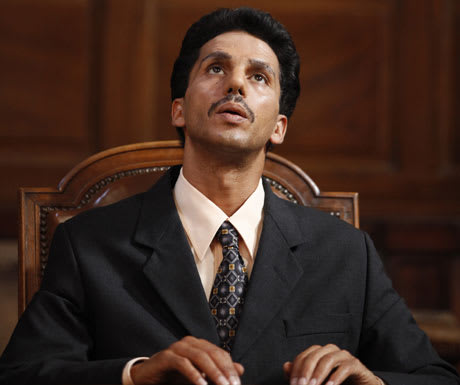Actor turned director Roschdy Zem offers his second full-length film to audiences expecting yet another sensationalized court case film. However, Omar Killed Me doesn't primarily focus on the legal system, rather it concerns itself with the racism, injustice and painstaking emotions a Moroccan gardener faced for seven years after being wrongfully incarcerated.
Based upon one the most sensationalized new stories of the '90s, Omar Raddad (Sami Bouajila) is arrested for the murder of employer Ghislaine Marchal, who was found brutally stabbed to death in her basement near a small suburb in France. The only reason Omar is the prime suspect in this murder case is because the words "Omar M'a tuer" ("Omar kill me") were written in Marchal's blood on the ground.
Despite the fact that Omar has a legitimate alibi, no blood on his clothes and how suspicious it looks for a highly educated woman to write a grammatically incorrect sentence on her death bed, the police lock up the hard-working, illiterate Moroccan gardener (who speaks little French) instead of investigating the crime scene.
During this time, a journalist (Denis Podalydes), who's convinced that Raddad is innocent, tackles the gruelling task of writing a novel to prove Omar's virtuousness. Viewers are then forced to watch the arduous obstacles Omar must overcome during his seven-year incarceration.
It's feasible to argue all day and night about just how much of the race issue in Omar Killed Me is a justifiable exploration of white/non-white tensions in France and how much sensationalism was used to spice up this astonishing story. However, the focal point is Omar's internal agony and the extreme measures he puts his body through in order to get justice.
Omar starves himself, even attempting suicide in his cell, yet still his prayers go answered. And when they finally are heard, when he receives a Presidential pardon in 1994, it's hard not to tear up when one of his young sons addresses Omar as "that man" rather than "daddy."
Omar Killed Me is a well-directed, expertly paced, mildly enthralling film. Sami Bouajila's portrayal of Omar is top-notch and without his ability to recognize and convey his character's emotions, the film would fail to create the sympathy and empathy viewers feel for Omar, which is essentially the emotional core.
(Mongrel Media)Based upon one the most sensationalized new stories of the '90s, Omar Raddad (Sami Bouajila) is arrested for the murder of employer Ghislaine Marchal, who was found brutally stabbed to death in her basement near a small suburb in France. The only reason Omar is the prime suspect in this murder case is because the words "Omar M'a tuer" ("Omar kill me") were written in Marchal's blood on the ground.
Despite the fact that Omar has a legitimate alibi, no blood on his clothes and how suspicious it looks for a highly educated woman to write a grammatically incorrect sentence on her death bed, the police lock up the hard-working, illiterate Moroccan gardener (who speaks little French) instead of investigating the crime scene.
During this time, a journalist (Denis Podalydes), who's convinced that Raddad is innocent, tackles the gruelling task of writing a novel to prove Omar's virtuousness. Viewers are then forced to watch the arduous obstacles Omar must overcome during his seven-year incarceration.
It's feasible to argue all day and night about just how much of the race issue in Omar Killed Me is a justifiable exploration of white/non-white tensions in France and how much sensationalism was used to spice up this astonishing story. However, the focal point is Omar's internal agony and the extreme measures he puts his body through in order to get justice.
Omar starves himself, even attempting suicide in his cell, yet still his prayers go answered. And when they finally are heard, when he receives a Presidential pardon in 1994, it's hard not to tear up when one of his young sons addresses Omar as "that man" rather than "daddy."
Omar Killed Me is a well-directed, expertly paced, mildly enthralling film. Sami Bouajila's portrayal of Omar is top-notch and without his ability to recognize and convey his character's emotions, the film would fail to create the sympathy and empathy viewers feel for Omar, which is essentially the emotional core.
